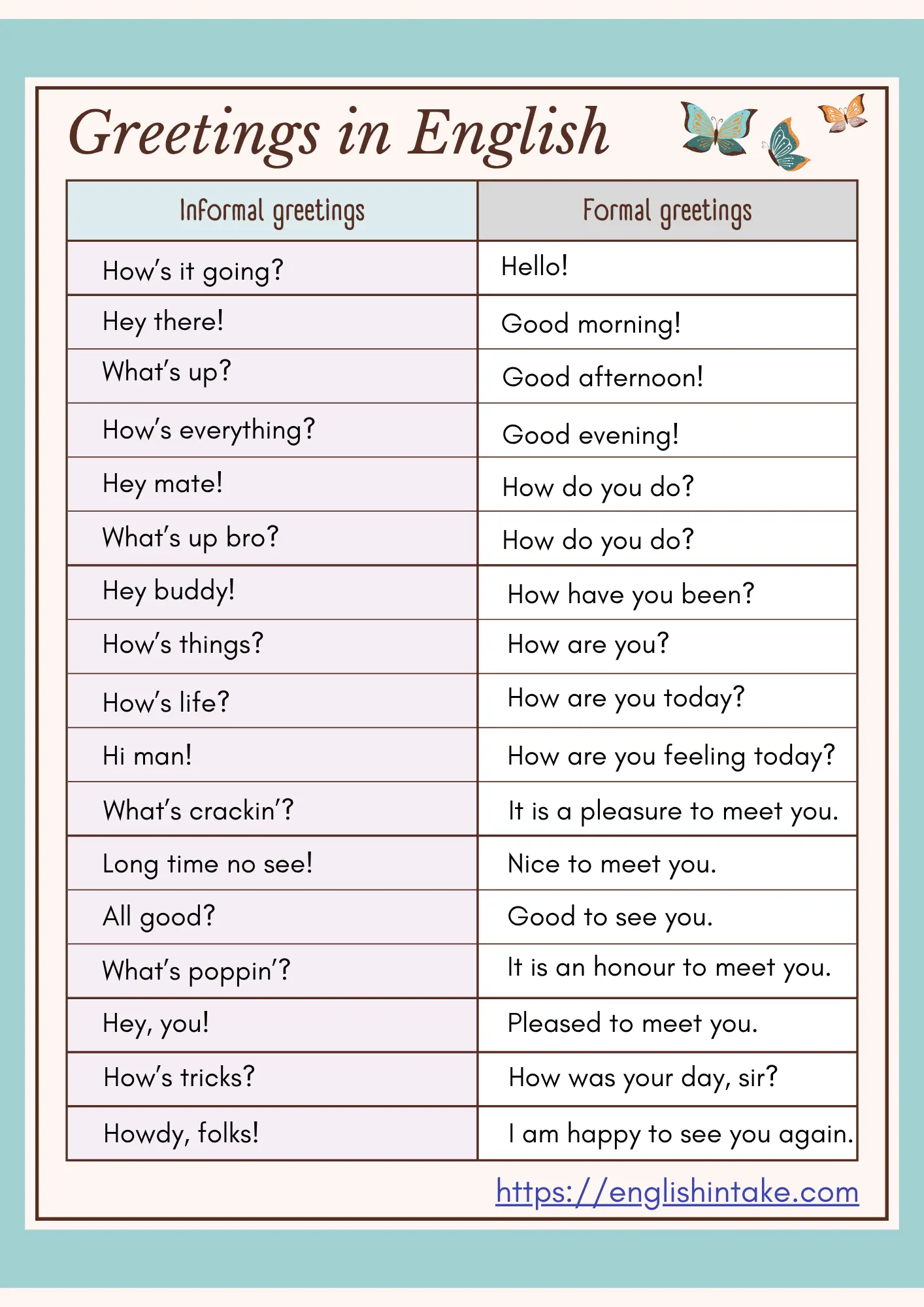1. How to greet someone in English?
Greetings in English are diverse. Some are formal, while others are not. Choosing the correct expressions can make a good first impression, especially in professional settings. In this lesson, we will learn different ways to greet someone.

2. Informal greetings
2.1 Checking how someone is doing
1. Hi! How are you?
2. Hi there! How are you?
3. Hey! How are you doing?
Possible answers
1. I’m fine.
2. Great, thank you. How are you?
3. Not bad.
4. Good.
5. Good. How are you doing?
6. Doing good. How are you doing?
7. Pretty good.
8. Fine, thanks, and you?
9. Not so good.
10. Not so well.
11. Not great.
12. I’m a little tired.
13. I’m OK. Just a little tired.
14. I’m not feeling well.
"How are you?" is another way to say "Hi". You do not have to give a detailed response about your health status.
2.2 A more casual way to say how someone is doing
1. How’s it going?
2. How’s things?
3. How are things?
Possible answers
1. Not bad.
2. Not too bad.
3. Good.
4. Pretty good.
5. Great. You?
6. Great. How about you?
7. Not so good.
8. Not so well.
9. Not great.
"How are you?" is a direct and personal question about someone’s well-being, whereas "How’s it going?" is a more general and casual greeting that doesn’t necessarily require a detailed response. However, if your response is negative, such as "Not so good" or "Not great", people will ask why.
2.3 Different meaning of “What’s up?”
1. What’s the matter?
2. What’s going on?
3. What’s happening?
4. What’s the problem?
5. What’s new?
6. What have you been doing?
7. What are you doing?
8. What are you up to?
Possible answers
1. Nothing. I'm fine.
2. I'm just a bit tired.
3. I lost my phone.
4. I'm feeling a bit ill.
5. I'm having a bad day.
6. I've got a headache.
7. I'm worried about my exam.
8. Not much, really.
9. I've just started a new job.
10. I'm learning to cook.
11. I've been busy working.
12. I went to London last weekend.
13. I've been reading a good book.
14. I'm waiting for the bus.
Read each conversation below to understand the meaning of What’s up in a different context.
Tom: Hi, Lucy! What's up?
Lucy: Hey, Tom! Not much. I'm just waiting for my bus.
Tom: Oh, okay. Where are you going?
Lucy: I'm going to the cinema. Do you want to come?
Tom: Yeah, sure! What's on?
Lucy: A funny film called "Happy Days".
Tom: Do you have tickets already?
Lucy: No, but we can buy them there.
(Later, at the cinema)
Tom: I'll buy the tickets.
Lucy: Thanks! Let's get some popcorn too.
Tom: Great! Let's go.
Emma: Hey, Jack! What's up?
Jack: Hi Emma! Nothing much.
Emma: Are you busy?
Jack: No, I'm just reading a book.
Emma: Are you up for a coffee?
Jack: Yeah. Do you want to go now?
Emma: That would be great if you don't mind.
Jack: Give me a second.
Emma: No problem.
A: Hi. What’s up?
B: Not much, just thinking about you. You?
A: That’s sweet! I’m just hanging out at home. Are you free for dinner tonight?
B: Sure, you know I’m always free for you, my dear.
A: Thanks, sweety! I’ll see you tonight. I love you!
B: I love you too!
3. Formal greetings
3.1 Formal greeting expressions in spoken English
1. Good morning.
2. Good morning, Mr / Mrs / Ms / Miss .... (name). My name is....(name). I work for .... (company).
3. Good morning, Mr / Mrs / Ms / Miss .... (name). How are you today?
4. Good morning. My name is....(name). I’m a .... (job title) at ....(company).
5. How do you do, .... (name)?
6. Good afternoon.
7. Good evening.
Possible answers
1. Good morning. It’s a pleasure to meet you.
2. Nice to meet you, .... (name)
3. Good to see you, .... (name).
4. Pleased to see you, .... (name).
5. Pleased to meet you, .... (name).
6. Good morning, .... (name). I’m doing well, thank you. And yourself?
7. Very well, thank you.
8. Great. How about you?
9. Good afternoon.
10. Good evening.
3.2 Example conversations
Wendy: Good morning, Professor Patrick. How are you doing?
Patrick: I am doing well, and you?
Wendy: I am doing alright. Thank you. My name is Wendy. I am a postgraduate student in Astronomy, and I would like to join your research group for my M.Sc. degree.
Patrick: That sounds great. Please tell me a little bit about your background and area of interest in Astronomy.
Wendy: Sure. I have taken several courses in computational physics and extragalactic astronomy. I am particularly good at programming and would like to pursue research in the large-scale structure of galaxies using computational methods.
Patrick: Excellent. You will be a good fit for our research group. Could you stop by in my office tomorrow at 4 PM so we can talk more about what we can do together?
Wendy: Sure, I will see you tomorrow, then.
Patrick: Perfect. See you tomorrow.
Receptionist: Good morning. How may I help you?
George: Good morning. My name is George. I have an appointment with Dr Rooney at 10 AM.
Receptionist: May I have your full name and date of birth to confirm your identity?
George: My name is George Sherman, and my date of birth is May 5th, 1954.
Receptionist: Thank you, Mr George. We have you on schedule. Can you please fill out this form? When it is done, please have a seat, and Dr Rooney will be with you shortly.
George: Sure, thank you.
[George fills out the form and waits in the waiting room.]
Dr Rooney: Good morning, Mr George. I am Dr Rooney. How are you feeling today?
George: Good morning, Dr Rooney. I am not feeling so well. I have been having some persistent back pain in the last few days.
Dr Rooney: Okay, let me take a look at your medical history, and we will go from there.
[The doctor reviews Mr George’s medical history and conducts a physical exam.]
Dr Rooney: Based on your symptoms and exam, we need to do some imaging tests to get a better look at what might be causing your back pain. My secretary will schedule an MRI scan for you, and we will start from there. In the meantime, if you have any concerns or questions, do not hesitate to call our office.
George: Thank you, I will see you next time.
Dr Rooney: Have a good day.
George: You too, doctor.
3.3 Formal greetings in a speech
Selected political speeches (use Google Chrome if the video does not work on your browser)
“Mr Speaker, Mr Vice President, members of Congress, distinguished guests, and fellow Americans: Tonight I want to begin by congratulating the men and women of the 112th Congress, as well as your new Speaker, John Boehner.” - Barack Obama, State of the Union Address, January 25, 2011.
“My Lord Chancellor, Madam Speaker, Lord Privy Seal, the Lord President of the Council, Mr Prime Minister, my Lords, and Members of the House of Commons. To the Lord Chancellor, the longer I hear you talk, the more I wish we had an institution like this in American Government.” - Bill Clinton’s Speech to the Houses of Parliament, November 29, 1995.
“Mr Speaker and Mr Vice-President, honourable members of Congress, I’m deeply touched by that warm and generous welcome. That’s more than I deserve and more than I’m used to, quite frankly. And let me begin by thanking you most sincerely for voting to award me the Congressional Gold Medal.” - Speech to the US Congress, Washington, D. C. 2003.
An example of an introductory speech during a student’s presentation
Good evening, distinguished guests, faculty members, and fellow students.
It is an honour to be here today to present my thesis titled “Star Formation Processes In The Milky Way”. This research has been an incredibly rewarding experience for me, and I am excited to share my findings with you all.
In a formal speech, it is important to use the appropriate title and address the person or group of individuals with the highest rank or title first, proceeding down with the list in descending order of rank.
During a student’s presentation, it is not always necessary to introduce yourself. In most cases, it is the chair of the session that introduces you to the audience. Therefore, introducing yourself again is not necessary. However, you can thank the chair of the session for introducing yourself.
3.4 Written communication
1. Dear .... (name),
2. Dear Sir/ Madam,
3. Dear .... (job responsibility),
4. Dear .... (job title) .... (name),
5. To Whom It May Concern,
Examples
1. Dear Fabian,
2. Dear Hiring Manager,
3. Dear Members of the Search Committee,
4. Dear Human Resources Manager,
5. Dear Professor Mark,
It is always better to address your recipient directly by name. If you do not know the name of the recipient, you can use their job title or job responsibility. When all of these are not possible, you can use "To Whom It May Concern". Notice that the first letter of each word is capitalised.
3.5 Telephone conversation
You can use the following expressions during a telephone conversation.
Calling someone
1. Hello, may I speak with .... (person’s name), please?
2. Hello, this is .... (your name). I’m calling to .... (purpose of your call)
3. Good evening, I was hoping to speak with you regarding .... (specific topic). Is now a good time?
4. Good morning/afternoon/evening, may I speak with .... (person’s name / department), please?
5. Hello, I’m calling from .... (name of your company), and I’d like to speak with someone in .... (specific department).
6. Thank you for taking my call. I’m interested in learning more about your .... (product / service) and was hoping someone could assist me.
Answering a call
1. Good morning/afternoon/evening, thank you for calling .... (company / department name). This is .... (your name) speaking. How may I assist you?
2. Hello, you’ve reached .... (company / department’s name). This is .... (your name), how may I help you?
3. Thank you for calling .... (company / department’s name). You are speaking to .... (your name). How can I be of service?
4. Welcome to .... (company/department name). This is .... (your name). How can I help you?
5. Hello, this is .... (your name) from .... (company / department’s name). How may I be of assistance?
